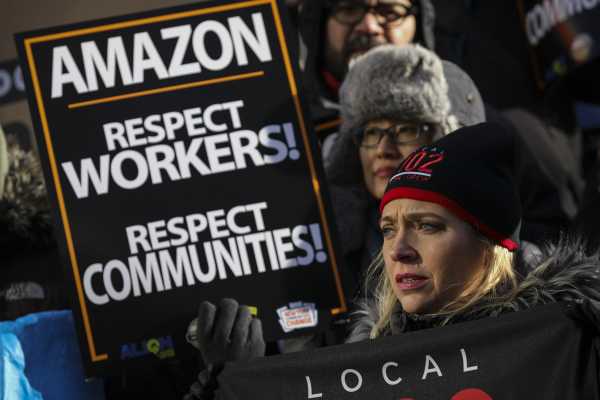

Amazon may not be coming to Long Island City after all.
The e-commerce giant is reconsidering its plans to open a new 25,000-employee office in Queens, New York, the Washington Post reported on Friday. Two people “familiar with the company’s thinking” told the Post that Amazon was turned off by growing local opposition to the deal, which has been building up since Amazon announced it would be building part of its so-called second headquarters in the Queens neighborhood last November.
“The question is whether it’s worth it if the politicians in New York don’t want the project, especially with how people in Virginia have been so welcoming,” a source familiar with the matter told the Post.
“We’re focused on engaging with our new neighbors — small business owners, educators, and community leaders,” an Amazon spokesperson said in an emailed statement to Vox. “Whether it’s building a pipeline of local jobs through workforce training or funding computer science classes for thousands of New York City students, we are working hard to demonstrate what kind of neighbor we will be.”
At least one person familiar with the company’s plans disputed the Post’s report that Amazon may end its plans in New York. “I think that’s a bit far in my opinion,” a source told New York Times reporter J. David Goodman.
While Gov. Andrew Cuomo and New York City Mayor Bill de Blasio both touted the deal as a great opportunity to bring tens of thousands of well-paying jobs to New Yorkers and billions of dollars in tax revenue to the state, other officials have expressed concern about the financial incentives Amazon would get in exchange. The state and city governments offered Amazon a combined $3 billion in tax breaks, though Cuomo claimed that the revenue Amazon’s presence will generate outweighs any financial incentives the company will receive.
“New Yorkers have real unmet needs from their government,” state Sen. Michael Gianaris and City Council member Jimmy Van Bramer said in a joint statement in November after the deal was announced. “We are witness to a cynical game in which Amazon duped New York into offering unprecedented amounts of tax dollars to one of the wealthiest companies on Earth for a promise of jobs that would represent less than 3% of the jobs typically created in our city over a 10 year period.” At a January City Council hearing, Speaker Corey Johnson told Amazon executives that the tax breaks were happening at the expense of “63,000 people sleeping in homeless shelters in New York City,” “subways that are falling apart,” and “schools that aren’t getting the money they deserve.”
“This seems like vulture, monopolistic capitalism at its worst,” Johnson said.
One big concern is how Amazon’s presence in Long Island City, an already rapidly gentrifying neighborhood, could affect rent prices in the area. At an anti-Amazon rally the day after the deal was announced, Van Bramer pointed out that the Queensbridge Houses, a public housing community a few blocks away from the site of the proposed Amazon development, had no heat or hot water.
“But somehow folks who consider themselves progressive Democrats have seen fit to throw away $3 billion to the richest man in the world,” Van Bramer said, referring to Cuomo and de Blasio’s plans and Amazon CEO Jeff Bezos. (De Blasio, for his part, claimed Amazon’s proximity to the Queensbridge Houses would lead to “incredible synergy” between the two.)
Amazon’s opponents have also expressed concerns about the company’s labor practices both in its Staten Island warehouse and around the world, as well as its staunch anti-union stance. “If the Amazon deal falls apart, they will have nobody to blame but themselves,” Stuart Appelbaum, president of the Retail, Wholesale and Department Store Union, which has repeatedly spoken out against the deal, said in a statement.
“With their long history of abusing workers, partnering with ICE to aid their persecution of immigrant communities, and contributing to gentrification and a major housing crisis in their hometown of Seattle, New Yorkers are right to raise their concerns and opposition to this plan. New Yorkers won’t be bullied by Jeff Bezos, and if Amazon is unwilling to respect workers and communities they will never be welcome in New York City.”
As Curbed notes, Gianaris, who represents Long Island City in the state Senate, was recently nominated to the Public Authorities Control Board, which would ultimately have approval power over the project. Gianaris’s position on the board could lead to the deal falling apart.
But it certainly doesn’t seem that Amazon has given up on New York City quite yet. The Post reports that Amazon has hired a lobbying firm and a public relations firm to boost its reputation among New Yorkers. The company also recently put an ad out for a “senior community affairs manager” who would be responsible for “developing a positive partnership with local stakeholders, community groups, and nonprofits.”
Cuomo and de Blasio, the Amazon deal’s most fervent advocates, have been in damage control mode since November. Earlier this week, de Blasio claimed that New York could help shift Amazon’s stance on unions. During a Friday appearance at the Crest Hollow Country Club on Long Island, Cuomo reportedly stressed the need for Amazon’s presence in New York. “We have to make Amazon a reality,” he said.
It’s also possible that Amazon may be trying to force the city’s hand by threatening to scrap the project altogether. Gianaris, for his part, told the Wall Street Journal’s Jimmy Vielkind that it was “very curious” that Cuomo “had a slide ready to be presented 10 minutes after the news broke that Amazon was reconsidering. A cynic might believe this is all orchestrated.”
And as Curbed’s Amy Plitt pointed out, Amazon retaliated against Seattle after the city, which is home to Amazon’s main campus, passed a law that would have levied a tax on Amazon and other large companies to provide additional funding for homelessness services and affordable housing. The City Council ended up repealing the law.
For now, Amazon’s future in New York remains uncertain. It could choose to stay in New York despite mounting opposition, opt to build a bigger campus in Crystal City, Virginia — the other half of the company’s so-called “HQ2” — or turn to one of the hundreds of cities that competed for the opportunity last year.
Sourse: vox.com





